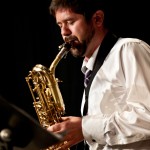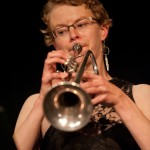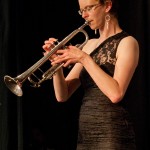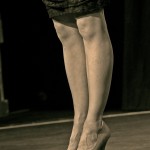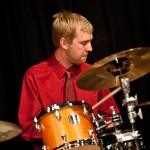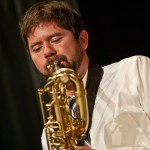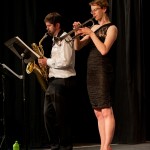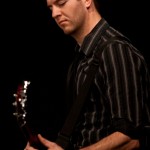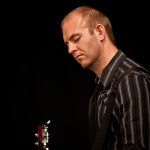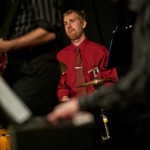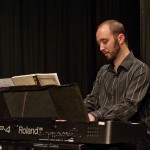The Jazz Council presents `The Music Of Miles Davis`at Centre 64 in Kimberley, Saturday, May 26th, 2012, 8pm.
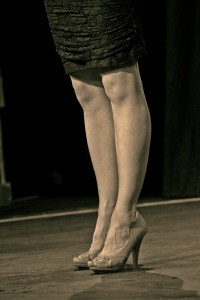 Miles Davis may not have been exactly a stand up guy (whatever that means). He was a one time heroin addicted misogynist with a hostile streak who literally defined the modern concept of ‘cool’ and left an indelible mark on the late 20th century Jazz world. He came of age during the halcyon days of be-bop. While still in his late teens he played with the giants of the era including, Charlie Parker, the inventor of be-bop. From then on he was never far from the creative front lines of improvised music and, more often than not, he was out in front of the pack as an innovator, collaborator and band leader. He led the way from the frantic world of be-bop to the cooler tomes of the “Cool School” in 1949 and back again to his own version of hard-bop. Despite an almost total physical collapse in the 50’s, he came back from his addiction to record a landmark series of albums with Prestige records before he moved onto to his collaboration with Columbia records in the 1960’s. In the Prestige era his recording partners virtually read as a who’s who of the jazz world of that era. Tunes he introduced at that time went on to become part of the standard jazz repertoire.
Miles Davis may not have been exactly a stand up guy (whatever that means). He was a one time heroin addicted misogynist with a hostile streak who literally defined the modern concept of ‘cool’ and left an indelible mark on the late 20th century Jazz world. He came of age during the halcyon days of be-bop. While still in his late teens he played with the giants of the era including, Charlie Parker, the inventor of be-bop. From then on he was never far from the creative front lines of improvised music and, more often than not, he was out in front of the pack as an innovator, collaborator and band leader. He led the way from the frantic world of be-bop to the cooler tomes of the “Cool School” in 1949 and back again to his own version of hard-bop. Despite an almost total physical collapse in the 50’s, he came back from his addiction to record a landmark series of albums with Prestige records before he moved onto to his collaboration with Columbia records in the 1960’s. In the Prestige era his recording partners virtually read as a who’s who of the jazz world of that era. Tunes he introduced at that time went on to become part of the standard jazz repertoire.
During his years with Columbia he recorded the monumental “Kind of Blue”, a complete step away from the chordal based improvisations of the time with his exploration of the use of modal scales. Although Miles was somewhat dismissive of the recording, jazz musicians call the album ‘The Bible’ and critics insist it is the one essential Jazz record everybody should own. It has sold millions copies and in over forty years has never been out of print. It has been re-issued in numerous ‘improved’ editions and is the subject of many, many magazine articles and at least one book – “Kind of Blue – The Making of the Miles Davis Masterpiece” (by Ashley Kahn). Although that album is a milestone (pun intended) Miles never stood still. He fronted numerous configurations of his classic quintets with mostly young innovative musicians. He had a very successful collaboration with the Canadian composer and arranger Gil Evans followed by an intense period of experimentation with electronic instruments and composition, recording methods and styles. Miles Davis died in 1991 of a massive stroke.
So, here we are twenty years on and the Jazz Council decided on doing a concert of Miles Davis music. They knew they were heading into pretty deep waters. The band (Laurel Ralston – trumpet; Sven Heyde – drums; Tim Plait – piano; Bernie Primbs – baritone sax and Joel Kroeker – bass), although some what intimidated by the task, they were well up to the challenge. They chose a chronological approach by picking tunes from various eras of Miles’ career. To start the evening they kicked it off with the 1947 be-bop classic “Donna Lee“ and followed it up with the 1949`s “Boplicity“. This is from “The Birth of the Cool“ an album that gave new meaning and direction to jazz. Bernie Primbs played some gorgeous baritone sax on the Miles classic 1956 ballad “My Funny Valentine“. The word classic tends to become overused for just about anything associated with Miles Davis. It is not hyperbole; it`s a fact. Miles was a classic act in just about anything musical he touched. Laurel used the Harmon mute for the Sonny Rollin`s masterpiece “Oleo“. This is also from the same 1956 period when Miles recorded the tune with Sonny Rollins on Tenor sax. The ballads “There is no Greater Love“ and “If I Were a Bell“ are also from the same period.
After the intermission the band took some time out to feature some of their own original tunes that included Bernie`s love song to his wife (“Quires Casarte Conmigo“), his “Everybody Could Use a Minor Funk“ and Joel Kroeker`s “Rainy Day Caper“ (a delicious romp through James Bond land). The band returned to Miles territory with “Freddie Freeloader“ from the “Kind of Blue“ album. On this particular tune Tim Plait appeared to be deep in the zone on his FP-4 keyboard. A couple of tunes from the electronic period, “Nefetiti“ and Wayne Shorter`s “Foot Prints“ completed the scheduled program for the evening. For an encore the “Kind of Blue“ album was revisited with the very atmospheric modal blues “All Blues“. As this was the final tune on the Miles Davis album it was very fitting end to the evening.
– Rod Wilson

